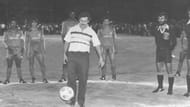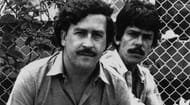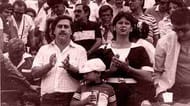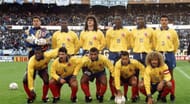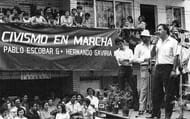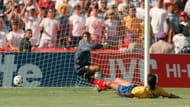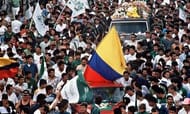Those who have managed to finish watching Netflix’s incredibly popular “Narcos”, a bloody take on the life of Colombian drug kingpin Pablo Escobar, will have gotten a superlative view on the reign of terror he unleashed upon the streets of the South American country; assassination attempts, blowing up planes and mercilessly killing anyone that stood in his way.
Hailed as a hero among the lower classes of his hometown of Medellin for the numerous initiatives he bankrolled for the betterment of the poor, almost every other class of citizen had a more sobering view of the man who was chiefly responsible for nearly 10,000 deaths during the heights of the Colombian war on drugs.
Yet, there was another side to one of history’s most infamous criminals; his soft spot for football. His passion and love for the game saw him pour millions into the sport – with the added incentive that it helped mask the cash flow from his drug business and was an effective way to launder money – and transform the face of Colombian football forever.
A keen interest in football
The story begins to unfold in the late 80’s; an era before which Colombian soccer wasn’t even a blip on the world map.
The country is popularly described as the birthplace of “Magical Realism,” a term used to portray magical or unreal elements as a natural part of an otherwise realistic or unreal environment; and that is exactly what soccer did to a country deeply divided by constant political and cultural upheaval.
The stars seemed to align and two factors, that of the rise of a new generation of incredibly talented players and an unprecedented flow of money into the game saw Colombia’s Atletico Nacional make a meteoric rise in the footballing scene; with it, the added scrutiny of people getting increasingly suspicious of the origins of such a rise which led to then unproven claims of the team being backed by Pablo Escobar.
While Escobar’s influence within the government, the police and other drug cartels is very well documented, very few will readily agree upon how much ‘El Patron’ is intertwined with Colombia’s rise as a footballing nation.
Jhon Jairo Velasquez Vasquez, more popularly known by his street name ‘Popeye’ was Pablo’s right-hand man and has confessed to killing nearly 250 people while dismembering many more. Yet, in The Two Escobars, a brilliant documentary by ESPN on Pablo and his namesake Andres Escobar, he admits to how football remained in Pablo’s mind even while they were hiding in a ditch, on the run from authorities.
“I could sense troops closing in, and I’m freaking out. Pablo turns to me and says: ‘Popeye!’ I think they’ve caught us, and I cock my M16, but he says: ‘Colombia scored a goal!’ Football was his joy; his escape; his cloud nine.”
His sister Luz Maria Escobar similarly reminisces, “My brother loved soccer. His first shoes were cleats, and he died in cleats. In the area around our old neighbourhood, Pablo donated lights and supplies for soccer fields.”
Humble beginnings
The 1960’s, Medellin, Colombia:
Pablo was one of seven children born to a farmer and a school teacher. Being born into poverty, he always harboured ambitions of being rich and successful and his ruthlessness in this regard was clearly evident from an early age.
“No rich person in Colombia does anything for the poor,” Jaime, his cousin recollects a conversation he had with Pablo. “How can we fix the inequality in our country? Steal from the rich, cousin! Rich people have cars; let’s steal that car right there!”
From these early beginnings, Escobar turned his attentions to more lucrative ventures like contraband and dealing drugs. A foray into dealing cocaine is where he eventually hit it big; He became the chief supplier of the drug in the US, providing around 80% of the supply at his peak.
His strategy dealing with pesky officials was simple, “Plata O Plomo?” which translates to “Silver or Lead?” i.e. either accept the bribe and live or take your honour and die.
Football as a means to launder
During the height of his powers, Pablo was earning around $50 million a day. He was listed by Forbes as one of the richest people on the planet, with a net worth of over $3 billion.
Constantly monitored by the authorities, initially, ‘El Senor’ spent his money any way he could to escape the attention of these officials; building zoos, buying innumerable cars, even burying cash in various parts of the country. But his flourishing trade in Medellin, Bogota, Cali and across the seas saw him raking in more money than he knew what to do with.
The only way he could legalise his money was through laundering and as his first cousin, Jaime Gaviria recalls, “Soccer moved millions of dollars.” All the ticket sales were through cash, and this allowed a team owner to falsely declare sales and legalise the differences. For Pablo, this killed two birds with one stone; it not only gave him an easy way to spend his money, but also help put his beloved Colombia back on the footballing map.
He subsequently declared his allegiance to Atletico Nacional and their city rivals Deportivo Independiente Medellin (DIM), financing them with the aspiration of winning the prestigious Copa Libertadores; a trophy that had never seen Colombian soil before.
Also read: Pablo Escobar's hitman sends a video message to Luis Suarez and the Uruguayan team
Francisco Maturana, then coach of Atletico spoke of how Pablo’s money helped in their rise to one of the top clubs on the continent, “The introduction of drug money in soccer allowed us to bring in great foreign players and keep our best players from leaving.”
However, Escobar wasn’t the only drug trafficker who was awash with cash and needed a means to legalise it; and he wasn’t the only one with a deep love for Colombian soccer.
This marked the beginning of what came to be popularly known as “narco-soccer.”
Dire consequences
Escobar’s entry into the footballing scene resulted in a tug-of-war among the drug lords for something a lot more important than money. Pride.
“El Mexicano,” another notorious drug lord became involved with the Millionarios and Miguel Rodriguez, a lynchpin of the Cali Cartel bought stakes with America de Cali. The clubs, however, were mere toys to these men and it was a competition to see who had the shiniest one.
This also saw numerous referees bought off by the cartels; showering them with indulgences and ostentatious gifts to ensure that results went their way. Their entry into football also coincided with violent clashes in the stands and on the pitch – with the assault of referees becoming commonplace.
But Pablo always had to take it one step further.
The national tournament in 1989 saw Escobar’s Atletico Nacional take on America de Cali and the match was officiated by Alvaro Ortega, a man widely thought to be in the pockets of the Cali cartel. With a lot of money riding on the game, some blatant decisions in favour of Cali saw them run out as winners. Pablo was never one to take such slights lightly and ordered the referee to be killed; the lengths he would go to ensure his club’s success was staggering and showed that he was ready to kill anybody that got in his way.
Success in the Copa Libertadores
South America’s most distinguished club trophy, the Copa Libertadores had always been a dream of Pablo and in 1989, they were looking to become the first ever Colombian team to successfully claim it.
One of his common indulgences was to regularly stage private matches at his home against an XI picked by El Mexicano. “The games were a friendly rivalry,” says Jaime Gaviria. “Pablo would say: ‘Pick your dream team – we’ll fly them to the ranch and bet.’” Players were generously compensated and the cartels would often wager upwards of $2 million on the outcome.
Colombia’s national team captain and Atletico Nacional player Andres Escobar – who was in no way related to Pablo, but still found that their fates were cruelly entwined – was one of the few who were genuinely uncomfortable about having to perform for drug traffickers and with the source of their wages. Many didn’t ponder too deeply about it.
After all, the Libertadores was in touching distance now. After being drawn in the same group as the Millionarios and clearing it, they beat Argentina’s Racing Club in the next round, Millionarios in the quarters and thrashed Uruguay’s Danubio 6-0 to set up a final with Paraguay’s Olimpia.
The atmosphere in the ground was feverish. Fans had thronged the ground in their thousands, all with the hope that Nacional would succeed where many others had failed before. The expectancy was clearly weighing on the shoulders of the players, and the pressure to perform was immense.
It all seemed to go wrong, with Nacional falling 2-0 behind within the first 15 minutes and losing the first leg. Pablo was present in the stands for the return-leg – but in Bogota, with Nacional’s stadium deemed too small.
With Andres Escobar anchoring the defence and flying goalkeeper Rene Higuita performing heroics, an own goal and a strike from Albeiro Usuriaga levelled the tie on aggregate, taking the game to penalties. “This is a moment for the history books,” gushed the Colombian commentator, a nation hanging on his words.
Andres Escobar slotted home Nacional’s first spot-kick with Higuita making athletic stops to deny the Olimpian players. With Nacional failing to capitalise on these advantages, the game went to sudden death, but the players kept wasting chances to seal the title.
“I told them: stop short, because their keeper is diving early,” said Maturana. “But no one listened… except for Leonel.” Following three missed opportunities for his side, Leonel Alvarez paused, read the dive, and hammered home the crucial penalty.
The rise of Colombian soccer
“Pablo jumped and screamed with every goal,” says Popeye. “I’d never seen him so euphoric. Normally, he was a block of ice.”
Nacional’s players were summoned to Escobar’s ranch for a giant party. “They came for their bonuses; Pablo even raffled off a truck,” says Jaime Gaviria. “For Pablo, the players weren’t commodities, they were friends. It went beyond money. He wanted them to be happy.” His friendships with the players began at an early age and continued when he invested in Nacional.
Escobar’s work for the community was well appreciated by the people. A large part of the contingent that Colombia sent to the U.S.A to participate in the World Cup grew up playing soccer in the fields that he helped build.
The best players in the country often came from a poor background, and Pablo understood and empathised with their struggle. Alexis Garcia, Chicho Serna, Rene Higuita, Leonel Alvarez, Pacho Maturana and Chonto Herrera, the spine of the national team, all began their career in the slums of Colombia.
To them, he was a saviour, not a drug lord that killed people. He provided them an escape from the rigours of daily life and encouraged them to be themselves, a sentiment never expressed by anyone from the middle-class or the government. Shunned by society, the pitches gave these impoverished kids a chance to feel important and live in a perfect world.
To the people, football was a religion, a sacred ground that was a source of national pride. It didn’t matter that the rise came as a consequence of drug-trafficking money, or that criminals were bankrolling it. Their influence saw Colombia compete globally against the best teams in the world, and any other source of concern was entirely secondary.
Francisco Maturana took charge of the national team and led the charge to qualification for the World Cup for the first time in twenty-eight years. Encouraging individuality and imagination, the players seemed to respond to his methods, and the results were beginning to show on the pitch.
In the buildup to the World Cup, Colombia played twenty-six matches and lost only one. They thundered through the qualification stages, letting in only two goals. However, their proudest achievement came in a match against Argentina.
Often greeted with harrowing chants of “drug dealer!“ at airports and by opposition fans, the players responded in stunning fashion, inflicting a 5-0 defeat upon La Albaceleste – one of the worst in their history – in a must-win match, thereby qualifying for the World Cup. The standing ovation they received from the Argentinian faithful was icing on the cake, compounding the faith that they were on the verge of something very special.
Football sold one thing to the Colombian people that nothing else could; hope.
It was the image that the nation paraded around to the rest of the world; it was their identity and it was during these matches that the entire country joined together as one, celebrating victory and shunning defeat. With Pele declaring them as favourites for the 1994 World Cup, the elation was at an all-time high in the nation.
Though the cracks had begun to show with the violence erupting on pitches, it took a turn for the worse once the U.S.A got involved.
Pablo elected into the House of Representatives
Once famous basketball player Len Bias died due to a cocaine overdose, the US declared war on drugs and proposed extradition as a means to curb the influence of the drug lords. Pablo was less than enthused, popularly saying “I’d rather have a grave in Colombia than a jail cell in America.”
This saw Pablo run for the House of Representatives, knowing that if he was elected, his diplomatic immunity would ensure he could not be extradited; however, he also ran because he maintained a vested interest in the people and seeing them happy, made him happy.
Propelled by the working-class support, he won the election. But from this point on, things began going wrong for Escobar. An investigation conducted by Minister of Justice, Lara Bonilla, found him guilty of the drug-trafficking charges and kicked out of his seat. In retaliation, Escobar had him assassinated.
Liberal Party candidate Luis Carlos Galan rode the wave of national anger that followed the murder to become his party’s presidential candidate; he promised stringent measures to punish the cartels and firmly supported extradition. Of course, Escobar had him killed too.
Pablo also tried to murder his successor, Cesar Gaviria, mistakenly believing that he was on a commercial airline and bombing it; that explosion killed more than a hundred passengers and saw the beginning of a violent tussle between the Medellin cartel and the government that saw nearly 540 police officers killed and over a thousand injured.
Subsequent imprisonment
In 1991, after extradition was successfully abolished – thanks in no small part to the corrupt politicians that Escobar had managed to buy off – Pablo turned himself in; on the condition that he would be allowed to serve his sentence in a prison of his making.
Thus, he constructed ‘La Catedral’ on the outskirts of Medellin, a massive expanse consisting of all the luxuries money could buy including, of course, a football field. He was known to invite players to compete in matches with him and his guards, with many players from the Colombian national side often spotted on their way to the prison.
In 1991, a go-between approached Diego Maradona, stating that a very important person in Colombia wanted to pay him “an enormous fee” to play a friendly alongside the likes of Rene Higuita.
“I was taken to a prison surrounded by thousands of guards,” claimed Maradona recently. “I said: ‘What the f**k is going on? Am I being arrested?!’ The place was like a luxury hotel. They said: ‘Diego, this is El Patron’. I didn’t read the newspaper or watch television, so I had no idea who he was! We met in an office and he said he loved my game and that he identified with me, because, like him, I’d triumphed through poverty.
“We played the game, and everyone enjoyed themselves. Later that evening, we had a party with the best girls I’ve ever seen in my life. And it was in a prison! I couldn’t believe it. The next morning, he paid me and said goodbye.”
Things took a turn for the worse when Rene Higuita stopped to speak to the media on his way to the prison. The national outcry that resulted led to him being imprisoned on charges of “being a mediator in a kidnapping,” but according to The Two Escobars, Higuita attributed the arrest to his association with the cartel.
“All they asked me about was Pablo,” he recalls of his interrogation. “He has always taken care of the poor: he built homes and pitches. But he is also responsible for an awful war. I had an opportunity to thank him personally for handing himself in. I did not think I was breaking the law.” Coach Maturana defended his player, saying: “If Don Corleone invites me to dinner, I show up.” But Higuita would miss the World Cup in the USA as a result.
Colombia crashing out of the World Cup and the fallout that followed
After it broke out that Pablo had murdered two of his henchmen inside La Cathedral, Gaviria had had enough. He sent a large military force down to Medellin to capture him and extradite him to the US. However, Pablo caught wind of this ploy through someone in the military in his pocket and escaped before they assaulted the prison. He took this as an act of war from Gaviria and proceeded to increase the frequency of his bombings. Colombia was at war and the people in a state of perpetual fear.
Betrayal from amongst his own and the growing influence of the other cartels saw his powers slowly diminish; often escaping through sheer luck alone. And even during these times he apparently used to turn to football as a solace and as an escape from the harsh reality that his empire was burning down before his eyes.
Maybe it’s a cruel irony then, that a man who had professed his love for the game so openly and done so much to promote it in Colombia would not live to see them compete in the US in 1994. In December 1993, Escobar was shot and killed by a member of the police force on the Medellin rooftops as he was trying to escape; he was wearing his football cleats.
It was probably for the best, because for all the hype that the national team generated before the tournament, they failed to get past even the group stages; a 2-1 loss to the hosts ending their dreams, and consequently many lives as well.
The fallout from their poor showing on the international stage was immediate and devastating. Barrabas Gomez, the brother of assistant coach Hernan, left the squad after death threats had demanded he didn’t play. The national team captain and Pablo’s namesake, Andres Escobar, popularly nicknamed “the gentleman of football,” and a role-model to thousands of young footballers, was confronted by three men and shot six times for his own-goal that led to their elimination from the World Cup; he succumbed to his wounds a few hours later.
Before their recent resurgence, the general feeling around the country was that their golden era of football was over even before it began. Numerous footballers began pulling out of the squads in fear for their lives.
Escobar’s death saw criminal involvement weeded out of the sport, and the stoppage in cash-flow saw the domestic scene suffer as a result. Colombia plummeted from 4th to 34th in the FIFA rankings over the course of the next three years while it took all the way till 2004 for another Colombian side to successfully win the Copa Libertadores.
Soldiering on
While the era of ‘narco-soccer’ was well and truly in the 1990’s with the cocaine businesses of the various cartels in full-swing, recent times have shown that the darker influences within the game still rear their ugly head from time-to-time.
Julio Humberto Grondona, a man, popularly known as “Don Julio,” served as the president of the Argentine Football Association for nearly thirty-five years. His death saw the collapse of any semblance of organisation within the FA and a frenzy to consolidate power.
Though their recent results in tournaments (bar losses in finals) may suggest otherwise, Argentine football is struggling to recover; with an inspired Lionel Messi often having to grab the team by the scruff of their necks and pull them over the line. Allegations of scandal have been aplenty, with gross financial mismanagement currently hurting the national team.
If South America feels too distant, look no further than Europe and the corruption scandal that rocked FIFA and UEFA; which saw UEFA President and FIFA President Michel Platini and Sepp Blatter banned from the game for six years.
While it may not be possible to eliminate such malignant influences from within the beautiful game in its entirety, the preservation of the integrity of the sport is of utmost importance, now more than ever.
